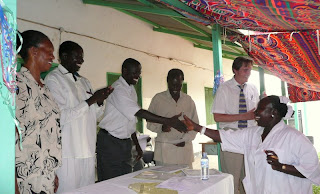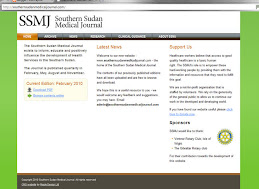

Part of Dario's House. It was a beautiful summer's evening
That evening the Hospital Director, Dario, invited us to his house along with all of our friends in JTH to say goodbye to us. About 30 people were present and Dario’s family laid on a fine feast with wine in the aftermath. Although Dario lived in Juba city, it felt more like we were in a close-knit village. There were about 25 people living in 6 tookalls (the huts they live in) within a fenced compound, all of whom were Dario’s relatives. The courtyard was everyone’s “lounge” with tables and seats outside. They all take their meals together, chat together and the kids play together. It was a really lovely, friendly set up, which made for a relaxing experience. A perfect end for us, marred only by the rancidity of having to say goodbye to all of our close friends. James summarised the event quite poetically, “I am glad saying goodbye has been so hard. It is a sign that we have made some strong, true friendships. It's a price worth paying.”

Hanging out with some of the JTH crew at Dario's
The next round of goodbyes came when we had to bid a fond farewell to the Comboni’s. Valentino gave us a big hug and they all said that we would be welcome back any time.


“What is a goldfish?”
“It is a small orange fish that we keep in a tank.”
“Do you eat them?”
“No!” I laughed
“Well what do you do?”
“We watch them swimming.”
“Why?”
“Because it’s what we do. It’s fun.”
“How can this be fun?”
I realised how stupid the whole thing must have seemed to her and when I thought about it, it is. It’s little things like this that make you chuckle.
Oddly enough, it is being here with these people, immersing yourself in their way of life that makes you realise some of the imperfections in our own society. Allow me to elaborate.
I spoke to Martin, the Obs and Gynae Consultant about English Society. “Do you speak to strangers when you wait at a bus stop, Martin?” “All the time.” He answered.“At home,” I continued, “We do not speak to strangers. If I was to speak to a stranger, the first thing that would go through their mind is ‘What does he want?’”
James and I have often talked with the Comboni’s and we find it interesting that we started out as Westerners thinking that African society was not as good as Western Society. Many people want to “help” Africa by making it more Westernised. Although in some respects this is good, is it all good? Probably not when you consider that 25% of the British population have been registered as depressed at some point in their lives.
I believe that all of us, whether we be African or English, have profited emotionally and spiritually from this experience. For us, we have developed a new found humility and respect for Southern Sudanese values and their way of life. These guys know what they want and they will achieve their goals irrespective of the St Mary’s Juba Link, NOT because of it. However, they really appreciate the helping hand.
However, there is something that I am going to import from these people - their humility and gratitude for the good things (such as oxygen that flows out of the walls of hospitals, drinking water from a tap etc.), their kindness and hospitality to strangers, and their sense of family and community. Our anonymous and fragmented society, hopelessly lost in the relentless worship of consumerism, would do well to learn from them.
Dave and James






















